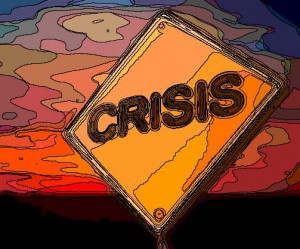 Crisis is an immanent part of our selves. It has become a daily experience, that is a feature of the everyday: we can see it in the media where it is represented in relation to politics, the economy, the law, religion and much else; we can feel it in the perception of difficulty which pervades the entire scientific (or, as one might have said of yore, “spiritual” or “natural”) system, by which I mean the essential part of our lives; and finally, we personally experience it in ways which often escape our awareness and our capacities for verbalization.
Crisis is an immanent part of our selves. It has become a daily experience, that is a feature of the everyday: we can see it in the media where it is represented in relation to politics, the economy, the law, religion and much else; we can feel it in the perception of difficulty which pervades the entire scientific (or, as one might have said of yore, “spiritual” or “natural”) system, by which I mean the essential part of our lives; and finally, we personally experience it in ways which often escape our awareness and our capacities for verbalization.
The paper argues that this philosophical problem does not need to be addressed in terms of the question:“why are we in crisis?”, which might require us to provide reasons for and to legitimize our current state.
Rather, this issue must be addressed in terms of the question: “how should we think about crisis?”, which asks us to explain how crisis should be integrated into our understanding of the world, and our actions. What is called for is not so much an etiological or causal approach as a modal one, which – by way of allusion – will here be treated a s part of Kant’s categories of modality.
Along this path the concept of crisis reveals its intrinsic revolutionary value. In this sense, speaking about crisis means speaking about revolution and the attempt of a new semantic frame for the first concept – which will be in this context explicitly pursued – becomes a way for articulating the same attempt – but this time dedicated to the second one. Pursuing such a line, the paper tries to realize a comprehensive redefinition of the word crisis, first.
Secondly, it deals with an attempt of semantic enlargement of the concept of crisis, namely the idea of crisis as edge of possibilities. Going further, the third move is devoted to the attempt of linking the concept of crisis to the concept of revolution.
From a comprehensive point of view, the paper seeks to bring together two Weberian idealtypical ways of addressing this last issue, by merging the idea of revolution as “opening of possibilities for liberties”, which was articulated by Hanna Arendt, with the idea of “fusions of horizons” deve loped by Hans-Georg Gadamer.
